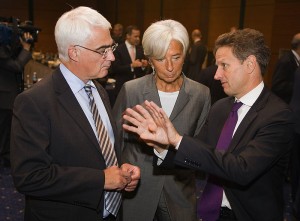[Editor’s note: I’d like to thank Arthur Stein, UCLA and Richard Rosecrance, Harvard for the early discussions we held on the issues raised in this blog post. They are not responsible for any of the opinions expressed here. ASA]
Pronouncements of American decline miss the real transformation under way today. What is occurring is not American decline but a dynamic process in which other states are catching up and growing more connected.
The above excerpt is the opening to the concluding section of John Ikenberry’s precis – his article in the recent May/June edition of Foreign Affairs, “The Future of the Liberal World: Internationalism After America” of his most recent book, Liberal Leviathan: The Origins, Crisis, and Transformation of the American World Order.
It may well be that a final evaluation of Ikenberry’s examination of the evolving global governance system will require a close reading of the book. But for the moment let me assume that this FA is a relevant summary of the Liberal Leviathan’s thesis.
The question that John poses is whether we are witnessing just the decline of the United States – or I suppose slightly more correctly the ‘rise of the rest’ – or, in fact, we are also witnessing the decline of the liberal world order promoted most fiercely by the United States. If the latter is true then the global order will not only look less American but less liberal. As the newly emerging states become more central to the world order, they will bring a more illiberal – less open, less rules-based and less democratic – world order. As John identifies this:
Rather, the struggle will be between those who want to renew and expand today’s system of multilateral governance arrangements and those who want to move to a less cooperative order built on spheres of influence.
The global governance system of the future will be more fragmented, less multilateral and more mercantilist. But John argues that this is not the future of the international order. And he suggests this more illberal outcome is not necessarily in our future by distinguishing and separating the current multilateral order from the United States. So while the global governance system has been built by the United States and supported by its traditional allies, liberal internationalism, “openness and rule-based relations enshrined in institutions such as the United Nations and norms such as multilateralism” will continue to exist without the United States as the hegemon. While the US, according to John, will not rule in the way it has in the decades since World War II, it will still be able to lead – and presumably it will do so. And the reason for this is: the rising powers – the Chinas, Brazils and Indias – are also wed to the global governance order of liberal internationalism.
For John the current global order is built on two ordering principles – the first built on the evolution of states and the principles of state sovereignty and and norms of more or less collaborative great power relations. And the second is built on the liberal order of a open, rules-based and and democratic international order. Indeed the building of the state system was necessary for the building of the second – the liberal order.
Now international relations specialist have long debated whether a hegemon – the UK in the 19th century and the United States in the second half of the twentieth century – is a necessary element for maintaining a liberal order. With John’s identified bifurcation, we need to determine whether the evolving international system of great powers is able to maintain a stable international order and to promote a liberal order.
John is certainly right that there is no strong evidence that the current Chinese leadership – the exemplar of the newly arrived rising states – rejects either element of the order – that is collaborative great power relations and as well a liberal order of open trade and a rules-based system. But not having rejected the order as it currently exists is not the same thing as saying the Chinese leadership accepts and is prepared promote these norms and mechanisms of the global order. And it it is possible that China might accept one principle – say great power stability – and yet fail to promote the other – the liberal order. John acknowledges that stability is required for a liberal order. But could it be that the evolving system may promote stability and great power accomodation – of a rather classic form – without necessarily promoting or even maintaining the current liberal order.
Where is the Chinese leadership? There is no question that China has benefited dramatically from both elements of the order – international stability and openness – but China’s emergence as a great power and the perception – and I emphasize perception of US decline – may have led some of China’s current leaders to reassess China’s place in the global order and reflect on how it must act or indeed how others – especially the United States – must act. Further, the perception of decline worryingly may have “infected” the next generation of leadership that will assume leadership in another year.
Let me look briefly at the second element of the current order – its Liberal nature. Certainly China has become deeply integrated in the international economy – and that the degree of integration contrasts vividly with other rising powers of earlier decades. But many suggest that China has dramatically benefited from advantages not employed by others. China’s export trade policy has driven its economic growth – and it has been a boon to US multinational corporations as well, might I say – but the imbalances generated in the system are creating volatility and instability. And it would appear the leadership – notwithstanding all the statements of a turn to a more domestic consumption-based model – is unwilling to abandon the export growth model that brought it such rapid economic growth. Remember the leadership believes that it is essential to maintain high growth to avoid social unrest.
And as for democracy, the Party appears to determined to maintain one-party rule notwithstanding that the rule of law and democratic practices are the foundation of modernity. While democracy may be the ideal there appears to be no appetite for it among the current leadership and there is nothing to suggest that the coming new generation of leadership is in any degree more enticed by the ideal notwithstanding the rise of a middle class in China. As a punctuation mark it is clear that China does not accept humanitarian intervention the newest aspect internationally of the liberal world order.
And as for multilateralism and the acceptance of restraint and collaborative great power relations, the signs are there but unilateralism and regional dominance have not disappeared from Chinese policy. Just when you think the Chinese have accepted collaborative great power relations and multilateralism, there are the behaviors, or lack of behaviors, over Korea, the South China Seas and military – to – military relations with the US.
So there is a large question mark and not an explanation mark on Chinese policy and its support for a liberal order. But the question of the passing of a liberal order is not just to be laid at the doorstep of China. It is also a question mark that now lies over US policy. The continuing illiberalism over trade policy – the assertion continuously of a lack of a level playing field – is a marked contrast in US foreign policy to earlier periods of liberal leadership. The so-called “leading from behind” strategy – whatever that is – of the current US Administration leads to rising questions of US leadership – not just rule. The chaos of domestic politics that undermines the prospect of the US dealing with its fiscal situation also raises concern that it will – and maybe cannot lead.
The saving element of this particular question – the maintenance of a liberal order, may come down to definition. As one of my close colleagues Arthur Stein from UCLA asks “What is the liberal order?” Maybe just as we have built a literature that examines the varieties of capitalism, so, according to Arthur, we must try and determine the varieties of liberalism that may still represent an international liberal order. It may still be a liberal order notwithstanding more managed exchange rates and new rules on capital controls. Or maybe not.
So the question of what is recognized as a liberal order may strongly influence whether we we are able to assess whether a liberal order can be maintained with or without the United States. The likely reality is that the liberal order is not just built on US leadership but it surely includes US leadership. It is a more open question whether we need China and others to sustain the liberal order. But it too is a question that needs to be answered.
The liberal order – however defined – may survive China’s growing great power presence, but I think it quite possible that without US participation not only will US leadership disappear but also the liberal order it built over the decades. Then the remaining question will be, can we retain collaborative and accommodative great power relations.
The agenda for the renewal of the liberal international order should be driven by this same imperative: to reinforce the capacities of national governments to govern and
achieve their economic and security goals. … In this new age of international
order, the United States will not be able to rule. But it can still lead.





